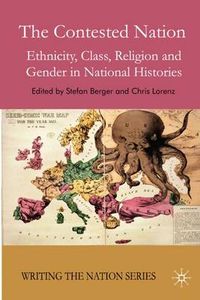
endast ny
The Contested Nation
How did national histories in Europe come into being and which were most successful in underpinning national identities? Who constructed the narratives of 'the nation' and why were they accepted, rejected or contested? How did the discourse of 'the nation' integrate narratives of ethnicity, race, class, religion and gender? This volume provides answers to these questions in a truly comparative and transnational way. It highlights how ideas and cultural practices travelled across national boundaries, analyzing, among other things, the formative influence of religious storylines (for example, 'The Promised Land' and that of 'Birth, Death, and Resurrection' on national narratives. It also explains why and how so many national histories in Europe portrayed other nations as their particular enemies, thus uncovering the intricate interrelationships between separate national histories and highlighting the role their writers have played in paving the conflict-ridden and bloody road to a united Europe in the 21st Century.
Utgiven: 2008
ISBN: 9780230300514
Förlag: Palgrave Macmillan
Format: Häftad
Språk: Engelska
Sidor: 634 st
How did national histories in Europe come into being and which were most successful in underpinning national identities? Who constructed the narratives of 'the nation' and why were they accepted, rejected or contested? How did the discourse of 'the nation' integrate narratives of ethnicity, race, class, religion and gender? This volume provides answers to these questions in a truly comparative and transnational way. It highlights how ideas and cultural practices travelled across national boundaries, analyzing, among other things, the formative influence of religious storylines (for example, 'The Promised Land' and that of 'Birth, Death, and Resurrection' on national narratives. It also explains why and how so many national histories in Europe portrayed other nations as their particular enemies, thus uncovering the intricate interrelationships between separate national histories and highlighting the role their writers have played in paving the conflict-ridden and bloody road to a united Europe in the 21st Century.
Ny bok
1502 kr1581 kr
5% studentrabatt med Studentapan
Begagnad bok (0 st)
Varje vecka tillkommer tusentals nya säljare. Bevaka boken så får du meddelande när den finns tillgänglig igen.



